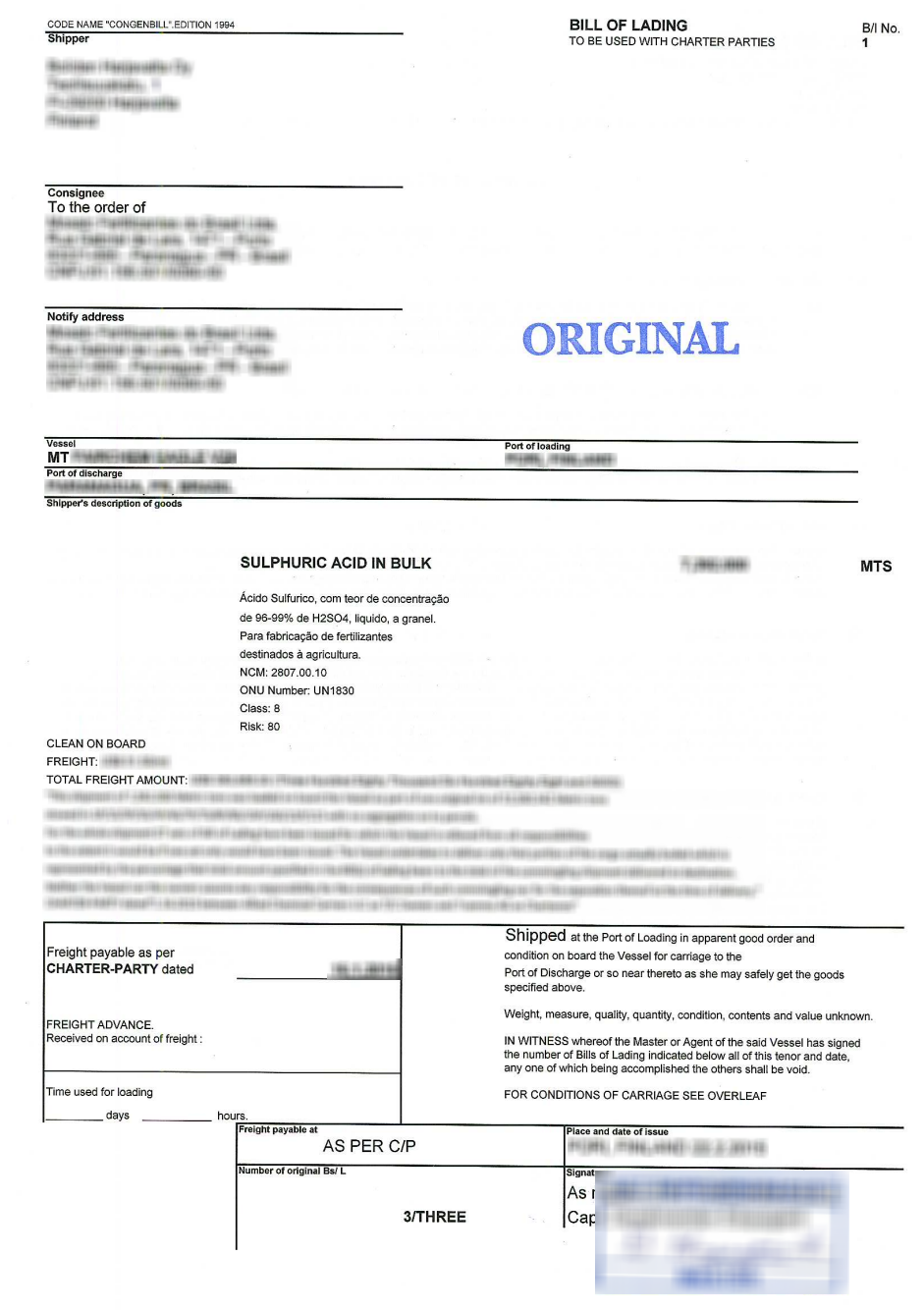|
Standard Trading Conditions
Standard Trading Conditions (STC) are standardized terms imposed by some countries for accepting cargo by shipping lines, airlines and logistics services providers like freight forwarders and customs agents. They are usually printed as the fine print behind the shipping documents like bill of lading, air way bill, or consignment note. These standard trading conditions state the general contract terms and conditions between the two contracting parties who do a contract of transportation or storage or otherwise handling of goods. They are often based on the standardized trading rules suggested by FIATA The FIATA International Federation of Freight Forwarders Associations is a non-governmental organization representing freight forwarders worldwide. According to the FIATA Annual Report 2021, FIATA counted 109 Associations Members representing .... References {{DEFAULTSORT:Standard Trading Conditions International trade ... [...More Info...] [...Related Items...] OR: [Wikipedia] [Google] [Baidu] |
Cargo
Cargo consists of bulk goods conveyed by water, air, or land. In economics, freight is cargo that is transported at a freight rate for commercial gain. ''Cargo'' was originally a shipload but now covers all types of freight, including transport by rail, van, truck, or intermodal container. The term cargo is also used in case of goods in the cold-chain, because the perishable inventory is always in transit towards a final end-use, even when it is held in cold storage or other similar climate-controlled facility. The term freight is commonly used to describe the movements of flows of goods being transported by any mode of transportation. Multi-modal container units, designed as reusable carriers to facilitate unit load handling of the goods contained, are also referred to as cargo, especially by shipping lines and logistics operators. Similarly, aircraft ULD boxes are also documented as cargo, with an associated packing list of the items contained within. When empty conta ... [...More Info...] [...Related Items...] OR: [Wikipedia] [Google] [Baidu] |
Logistics
Logistics is generally the detailed organization and implementation of a complex operation. In a general business sense, logistics manages the flow of goods between the point of origin and the point of consumption to meet the requirements of customers or corporations. The resources managed in logistics may include tangible goods such as materials, equipment, and supplies, as well as food and other consumable items. In military science, logistics is concerned with maintaining army supply lines while disrupting those of the enemy, since an armed force without resources and transportation is defenseless. Military logistics was already practiced in the ancient world and as the modern military has a significant need for logistics solutions, advanced implementations have been developed. In military logistics, logistics officers manage how and when to move resources to the places they are needed. Logistics management is the part of supply chain management and supply chain engine ... [...More Info...] [...Related Items...] OR: [Wikipedia] [Google] [Baidu] |
Freight Forwarder
A freight forwarder, or forwarding agent, is a person or company who, for a fee organizes shipments for individuals or corporations to get goods from the manufacturer or producer to a market, customer or final point of distribution."Freight forwarder." ''Random House Unabridged Dictionary'' (1997). Random House, Inc., on Info, please. Retrieved 21 December 2012. Forwarders contract with a carrier or often multiple carriers to move the goods from one country to another. A forwarder does not move the goods but acts as an expert in the network. The carriers can use a variety of shipping modes, inc ... [...More Info...] [...Related Items...] OR: [Wikipedia] [Google] [Baidu] |
Small Print
Fine print, small print, or mouseprint is less noticeable print smaller than the more obvious larger print it accompanies that advertises or otherwise describes or partially describes a commercial product or service. The larger print that is used in conjunction with fine print by the merchant often has the effect of deceiving the consumer into believing the offer is more advantageous than it really is. This may satisfy a legal technicality which requires full disclosure of all (even unfavorable) terms or conditions, but does not specify the manner (size, typeface, coloring, etc.) of disclosure. There is strong evidence that suggests the fine print is not read by the majority of consumers. Fine print may say the opposite of what the larger print says. For example, if the larger print says "pre-approved" the fine print might say "subject to approval".AG filing against BlueHippo Especially in pharmaceutical advertisements, fine print may accompany a warning message, but this messag ... [...More Info...] [...Related Items...] OR: [Wikipedia] [Google] [Baidu] |
Bill Of Lading
A bill of lading () (sometimes abbreviated as B/L or BOL) is a document issued by a carrier (or their agent) to acknowledge receipt of cargo for shipment. Although the term historically related only to carriage by sea, a bill of lading may today be used for any type of carriage of goods. Bills of lading are one of three crucial documents used in international trade to ensure that exporters receive payment and importers receive the merchandise. The other two documents are a policy of insurance and an invoice. Whereas a bill of lading is negotiable, both a policy and an invoice are assignable. In international trade outside the United States, bills of lading are distinct from waybills in that the latter are not transferable and do not confer title. Nevertheless, the UK Carriage of Goods by Sea Act 1992 grants "all rights of suit under the contract of carriage" to the lawful holder of a bill of lading, or to the consignee under a sea waybill or a ship's delivery order. A bill of ... [...More Info...] [...Related Items...] OR: [Wikipedia] [Google] [Baidu] |
Consignment Note
A bill of lading () (sometimes abbreviated as B/L or BOL) is a document issued by a carrier (or their agent) to acknowledge receipt of cargo for shipment. Although the term historically related only to carriage by sea, a bill of lading may today be used for any type of carriage of goods. Bills of lading are one of three crucial documents used in international trade to ensure that exporters receive payment and importers receive the merchandise. The other two documents are a policy of insurance and an invoice. Whereas a bill of lading is negotiable, both a policy and an invoice are assignable. In international trade outside the United States, bills of lading are distinct from waybills in that the latter are not transferable and do not confer title. Nevertheless, the UK Carriage of Goods by Sea Act 1992 grants "all rights of suit under the contract of carriage" to the lawful holder of a bill of lading, or to the consignee under a sea waybill or a ship's delivery order. A bill o ... [...More Info...] [...Related Items...] OR: [Wikipedia] [Google] [Baidu] |
Contract
A contract is a legally enforceable agreement between two or more parties that creates, defines, and governs mutual rights and obligations between them. A contract typically involves the transfer of goods, services, money, or a promise to transfer any of those at a future date. In the event of a breach of contract, the injured party may seek judicial remedies such as damages or rescission. Contract law, the field of the law of obligations concerned with contracts, is based on the principle that agreements must be honoured. Contract law, like other areas of private law, varies between jurisdictions. The various systems of contract law can broadly be split between common law jurisdictions, civil law jurisdictions, and mixed law jurisdictions which combine elements of both common and civil law. Common law jurisdictions typically require contracts to include consideration in order to be valid, whereas civil and most mixed law jurisdictions solely require a meeting of the mind ... [...More Info...] [...Related Items...] OR: [Wikipedia] [Google] [Baidu] |
FIATA
The FIATA International Federation of Freight Forwarders Associations is a non-governmental organization representing freight forwarders worldwide. According to the FIATA Annual Report 2021, FIATA counted 109 Associations Members representing the freight forwarding industry within a territory and 5959 Individual members, representing freight forwarding and logistics companies. consulted on 15 December 2022 History and organization FIATA was founded in , Austria, on 1926 and owes its name to its acronym french: Fédération Internationale des Associations de Transitaires et Assimilés. Also known as the ‘Architects of Tran ...[...More Info...] [...Related Items...] OR: [Wikipedia] [Google] [Baidu] |





